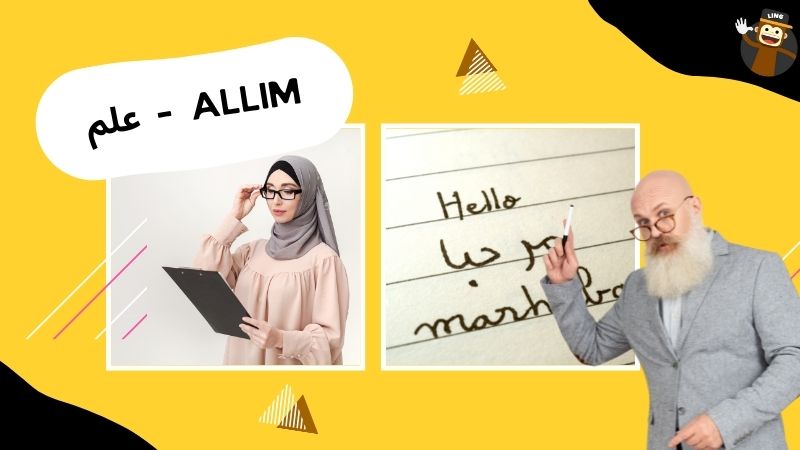Everything in an Arab country is hard to do or achieve with little to no knowledge of the Arabic verbs. From giving a presentation to asking a favor from someone, verbs are an ultimate need. This blog post will help you learn all the essential Arabic verbs to assist you in every step. Ready to take the world by storm? Let’s get started!
Role Of Arabic Verbs In the Arabic Language
According to western scholars, Arabic is a very flexible language. In this written language, all the written verbs change their forms. The root consonants are sometimes written with suffixes and prefixes to state specific meanings and connotations.
This addition sometimes changes the verb into an adjective, making it flexible and easy to understand.
When it comes to grammar, the Arabic language has many rules. In most cases, a slight change of a letter or a symbol can cause the masculine form to change into a feminine form and a singular word into a plural one.
Arabic is primarily written in Modern Standard Arabic (MSA). The Arabic language might or might not be hard for you as it consists of many grammatical components like root consonants, nouns, adjectives, weak verbs, hollow verbs, proper verbs, radicals, everyday verbs, a particular verb, proper verbs, assimilated verbs, verbal nouns, and many other verbs, which will be discussed in this blog post.
Different Arabic Verbs

The verb is the essential component of the sentence structure of any language. The same goes for the Arabic language. If you feel overwhelmed by this storm of information, let’s look at some examples to make it easier.
Qabil – قابل
The Arabic verb qabil – قابل means meet or to meet. It is a four-letter Arabic word that consists of ق/ﻗـ – qaf, joined with ا/ـﺎ – alif, ب/ﺑـ – bah, and finally ل/ـﻞ – laam. It consists of one long vowel and three consonants.
The word qabil – قابل is written in many ways, and the pronunciation of the word changes significantly according to the tenses in which they are used.
The same word is pronounced as qabal – قابل in terms of past tense, while in the imperative case, the pronunciation becomes qabil – قابل.
Similarly, the verb qabil – قابل changes into muqabil – مقابل in active participle form, which means one who meets. In passive participle, it becomes muqabal – مقابل, which means to be completed.
Arabic words are challenging to learn and might take longer to understand, but once you overcome this first hurdle, you will find it extremely easy. Brace yourself for more Arabic verbs!
Sa-id/Sayid – ساعد
The Arabic verb sa-id – ساعد means help/to help. It is a four-letter Arabic verb that consists of س – seen, ا – alif, ع – ain, and finally د – daal.
The word sa-id – ساعد can be written in various ways with slight while the root consonants stand still. The change in the pronunciation and spellings of the word is either because of the gender or the tense.
The word sa-id – ساعد changes into sa’ ad – ساعد when it is used in the past tense, and it means helping.
Similarly, the same word sa-id – ساعد changes into musa’id – مساعد, which means one who helps when it is used as an active participle. It changes into musa’ad – مساعد when it is used in passive participle form.
Kal’lim – کلم
The Arabic verb kal’lim – کلم means talk/to talk. It is a three-letter Arabic word that consists of kaaf – ک joined with laam – ل and finally meem – م. It is one of the most common verbs among the Arabic Verbs, and Arabic people love to talk, hence the verb.
The word kal’lim – کلم, like many other Arabic words, has several ways in which it is written and pronounced, depending on its position and placement in the sentence.
The word kal’lim – کلم changes to kal’lam – کلم, which is in Imperative form, means talked, and when it is used in the present tense, it changes to yukallim – یکلم which means talks.
Similarly, the word kal’lim – کلم changes into mukallim – مکلم when it is used as an active participle. It transforms into mukallam – مکلم when it is used in passive participle form.
Qab’bal – قبل
The Arabic word qab’bal – قبل means kiss/to kiss. It is a three-letter Arabic word. It is written by joining the first alphabet, ق – qaf with ب – bah, and finally ل – laam.
This Arabic verb sounds similar to the first one, qabil- قابل, but here, there is an emphasis on the alphabet ب – bah. A short vowel is placed on each alphabet in conjugation and standard form.
The word qab’bal – قبل is pronounced and written in many other forms depending on its placement in the sentence.
The word qab’bal – قبل, which is in Imperative form, changes into aqabbal – قابل in the present tense, which means kisses. And the same word transforms into qabbal’tu – قَبَّلتُ when used in the past tense, which means kissed.
Allim – علم

The Arabic word allim – علم means teach. It consists of three Arabic consonants. It is written by joining the first letter ع – ain with ل – laam and finally with meem – م.
This word is derived from Classical Arabic. It is one of the oldest Arabic words. As it has a small number of consonants, it was considered a short verb. It has no long vowels but short vowels in conjugations.
The word allim – علم is in the imperative form. It changes into allam – علم in the past tense, which is translated as taught, and to yu’allim – یعلم in the present tense, meaning teaches. In active participle form, it is written as mu’allim – معلم, which means the one who teaches, and in passive participle, it changes into mu’allam – معلم, i.e., to be prepared, and it has four consonants.
The word taalim – تعلیم which means teaching is used when the same word is to be used as a verbal noun in Arabic.
Idfa – ادفع
Arabs hate to see their guests pay, and thus it is commonly said that the Arabs argue when it comes to paying for the meal, not because they don’t have cash but because they have too much. It is less of a stereotype and more of a reality.
This fun fact takes us to our following Arabic verb, i.e., idfa – ادفع, meaning pay/to pay. It consists of three Arabic consonants and a vowel. The first Arabic alphabet and vowel alif – ا is written alone, followed by daal – د and fe- ف and then joined with the letter ain – ع.
The word idfa – ادفع is in the imperative form. It changes into dafa – دفع in the past tense, which is translated as paid, and to yad’fa – یدفع in the present tense, meaning pays.
In active participle form, it is written as da’ife – دافع, which is translated as payer, and in passive participle, it changes into mad’fou – مدفوع, which has a meaning of to be paid.
The word mad’fou – مدفوع has the radical waoo – و, which is the vowel u in the English language.
The word daf’ou – دفع, which means paying, is used when the same word is used as a verbal noun in Arabic.
Iftah – افتح
The Arabic word iftah – افتح means conquer/to conquer. It consists of three Arabic consonants and a vowel. The first letter or vowel alif – ا is written alone, followed by a Fe- ف and Te – ت, which is joined with the letter he – ح.
The word iftah – افتح is in the imperative form. It changes into fatah – فتح in the past tense, which is translated as conquered, and to yaftah – یفتح in the present tense, which is translated as conquers. In active participle form, it is written as fateh – فاتح, meaning a conqueror, and in passive participle, it changes into maftoh – مفتوح, i.e., to be conquered.
The word fatho – فتح, which means conquest, is used as a verbal noun in any sentence.
As’ha – اصح
As’ha – اصح means to wake up/to wake up. It is a three-letter Arabic word.
Since Arabic has a vast vocabulary, it is often said that the Arabic dictionary is the biggest and contains the most words in the world. So like most other Arabic verbs, it is written in many forms.
As’ha – اصح is in the imperative form. In the present tense, it is called As’ho – أصحو.
For masculine in the present tense, it changes to tas’ho – تصحو, and for feminine, it changes to tas’heen – تصحين.
For a singular person, it is yas’hoa – يصحو and tas’hia – تصحیا for masculine and feminine, respectively, and plural, it becomes yas’hoan – يصحوان and tas’hoon – تصحوان.
If you want to write the same verb in the past tense, it will be sahoot – صحوت. For singular masculine, it becomes saha – صحا, and for singular feminine, you can write saht – صحت. Similarly, for plural masculine, it becomes sahwa – صحوا, and for plural feminine, it becomes sahun – صحون.
If you want to use the same verb in active participle form, it becomes saah – صاح, which means waking up. The passive participle form of this verb is Mas’ho – مصحو, meaning woken up.
The word sahu – صحو, which means waking up, is used when the same word is used as a verbal noun in Arabic.
Phew! Done with the basics of verb conjugations. Yes, I said basics. But don’t worry; just like we broke down these conjugations into smaller, manageable chunks, we will make the complex grammatical concepts a piece of cake for you to devour.
Let’s now look at a list of verbs in different categories that you should learn and practice the conjugations mentioned above on.
Action Verbs
Taking specific actions is all the verbs are about, and thus here is a list of some action verbs you should be aware of if you want to be fluent in Arabic.
| English Verbs | Arabic Verbs | Romanized Version |
| Cry | بكاء | buka’ |
| Cut | يقطع | yaqtae |
| Dance | الرقص | alraqs |
| Fight | يقاتل | yuqatil |
| Fly | يطير | yatir |
| Laugh | يضحك | yadhak |
| Listen | استمع | aistamae |
| Play | لعب | laeib |
| Read | اقرأ | aqra |
| Ride | يركب | yarkab |
| Sing | يغنى | yughnaa |
| Sit down | اجلس | ajlis |
| Sleep | ينام | yanam |
| Stand up | الوقوف | alwuquf |
| Think | فكر في | fakar fi |
| Throw away | رمى | rumaa |
| Turn off | اطفئه | atfiah |
| Turn on | شغله | shaghalah |
| Watch TV | شاهد التلفاز | shahad altilfaz |
| Win | فوز | fawz |
Cooking Verbs

Love cooking? Learn these easy cooking verbs to taste all the Arabic dishes at the ease of your home.
| English Verbs | Arabic Verbs | Romanized Version |
| Add | يضيف | yudif |
| Bake | خبز | khubz |
| Boil | دمل | dumil |
| Break | فترة راحة | fatrat raha |
| Chop | يقطع | yaqtae |
| Cut | يقطع | yaqtae |
| Fry | يقلى | yuqlaa |
| Grate | صر | sur |
| Layer | طبقة | tabaqa |
| Melt | إنصهار | iinsihar |
| Mix | مزج | mazj |
| Peel | قشر | qashar |
| Roast | منال | manal |
| Roll out | يطرح | yutrah |
| Saute | مقلي | maqli |
| Slice | شريحة | shariha |
| Spread | انتشار | aintishar |
| Taste | المذاق | almadhaq |
| Weigh | وزن | wazn |
| Whip | سوط | sawt |
Useful Everyday Activities
There are so many things that take place in our everyday life. Not knowing such verbs will deprive us of the power to share detailed information about ourselves. Learn these verbs to talk about your everyday life.
| English Verbs | Arabic Verbs | Romanized Version |
| Brush the teeth | غسيل الأسنان | ghasil al’asnan |
| Brush your hair | مشط شعرك | musht shaerak |
| Do the laundry | يغسل الملابس | yaghsil almalabis |
| Drive to work | اقود إلى العمل | aqud ‘iilaa aleamal |
| Exercise | ممارسه الرياضه | mumarisuh alriyadah |
| Get dressed | يرتدى ملابسة | yurtadaa mulabasatan |
| Get home | عد الى البيت | eud alaa albayt |
| Go out with a friend | اخرج مع صديق | akhruj mae sidiyq |
| Go shopping | اذهب للتسوق | adhhab liltasawuq |
| Go to bed | اذهب إلى الفراش | adhhab ‘iilaa alfirash |
| Go to school | إذهب للمدرسة | iidhhab lilmadrasa |
| Hang the clothes | علق الملابس | ealaq almalabis |
| Iron the clothes | اكوي الملابس | akwy almalabis |
| Make the bed | رتب السرير | rutib alsarir |
| Play with friends | العب مع الاصدقاء | aleabu mae aliasdiqa’ |
| Surf the net | تصفح الانترنت | tasafuh alantirnit |
| Take a bath | استحم | aistahama |
| Take pictures | يلتقط الصور | yaltaqit alsuwar |
| Wake up | استيقظ | aistayqaz |
| Wash the car | اغسل السيارة | aghsil alsayaara |
Daily Chore Verbs

Chores are unfortunately an unavoidable part of everyone’s life. Learn about the daily chore verbs to have a fun and nice conversation with someone in Arabic.
| English Verbs | Arabic Verbs | Romanized Version |
| Change (the sheets) | غير اغطية السرير) | ghayr aghatiat (alsirir) |
| Drill | تدريبات | tadribat |
| Dry | جاف | jaf |
| Fold | يطوى | yutwaa |
| Hang | يشنق | yashnaq |
| Iron | حديد | hadid |
| Make (the bed) | رتب( السرير) | rutib (alsirir) |
| Nail | مسمار | mismar |
| Repair | بصلح | bisalh |
| Scrub | تنظيف | tanzif |
| Take out (the rubbish/ garbage) | إخراج (القمامة / القمامة) | iikhraj (alqumamat / alqumamatu) |
| Tighten | شد | shada |
| Vacuum | مكنسة | maknasa |
| Wipe off (the table) | امسح (الطاولة) | amsah (altaawilati) |
Action Words
Let’s now look at some action words to talk about several actions which every person has to come across at some point in their life. These are the leisure actions that will be the best to know if you go on vacation in Saudi Arabia.
| English Verbs | Arabic Verbs | Romanized Version |
| Bathing | الاستحمام | aliastihmam |
| Camping | تخييم | takhyim |
| Cleaning | تنظيف | tanzif |
| Counting | عد | eud |
| Cycling | ركوب الدراجات | rukub aldaraajat |
| Fishing | صيد السمك | sayd alsamak |
| Flying a kite | تحلق طائرة ورقية | tuhaliq tayirat waraqia |
| Lifting | رفع | rafe |
| Playing cards | لعب الورق | laeib alwaraq |
| Playing chess | يلعب الشطرنج | yaleab alshatranj |
| Playing instrument | أداة اللعب | adat allaeib |
| Playing volleyball | لعب الكرة الطائرة | laeib alkurat altaayira |
| Sharing | مشاركة | musharaka |
| Shouting | الصراخ | alsurakh |
| Skateboarding | التزلج | altazaluj |
| Surfing | تصفح | tasafah |
| Swimming | سباحة | sibaha |
Body Movement-Related Words
Lastly, let’s learn some verbs about body movement in Arabic. These verbs will help you talk about the actions that you do with a person’s body e.g., carrying a baby, etc.

| English Verbs | Arabic Verbs | Romanized Version |
| Bend | يلوي | yalwi |
| Carry | يحمل | yahmil |
| Dive | يغوص | yaghus |
| Drag | يجر | yajuru |
| Hit | يضرب | yudrab |
| Hold | يمسك | yumsik |
| Jump | القفز | alqafz |
| Kneel | اركع | arkae |
| Lean | يستند | yastanid |
| Leap | طفرة – قفزه | tafrat – qafzah |
| Lift | يرفع | yarfae |
| Pick up | يلتقط | yaltaqit |
| Pull | سحب. شد | sahub. shadi |
| Punch | لكمة | lakma |
| Push | يدفع | yadfae |
| Run | يجري | yajri |
| Sit | يجلس | yajlis |
| Squat | القرفصاء | alqurfusa’ |
| Throw | يرمي | yarmi |
| Tiptoe | رؤوس الأصابع | ruuws al’asabie |
| Walk | مشي | mishi |
Final Verdict
Let’s look at all the examples stated in the above lesson on Arabic Verbs. We can easily conclude that the Arabic language has a vast vocabulary and variety with using Arabic Verbs. It is effortless and straightforward.
Also, the suffixes and prefixes we see are used due to changes in tenses, gender, or some other essential parts of speech. This article will prove helpful for someone who wants to learn and translate Arabic.
Wrapping Up

That’s it for this blog post. If you learned Arabic verbs successfully, then it’s time to move on to other important topics that you can easily find here.
On Ling App, you can learn some of the most fantastic facts and features of the Arabic language. You can learn from the very basics like useful Arabic greetings and Arabic food to more complex things like sentence structures and grammatical intricacies.
Download the Ling App from Google Playstore or App Store and start learning the Arabic language now!!!



































































